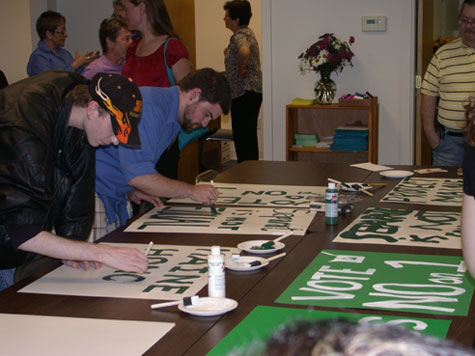
PRESENT AT THE CREATION Same-sex marriage supporters paint campaign signs.
|
More than a few people asked us why we are publishing this special section now — now that gay-marriage opponents have filed their People's Veto signatures, now that same-sex marriages will not be taking place at least until after Mainers vote on the issue on November 3.
Well, for one thing, as both sides of the gay-marriage referendum campaign kick into high gear, as they did last week, the issue is on people's brains — and citizens of the state are one step closer to celebrating these unions. But there's also this truth: no matter what happens between now and November 3, those who support gay marriage Maine have much to celebrate already. There's no question that this year has been an exciting one for same-sex marriage supporters, in Maine and around New England. In November 2008, the legal organization Gay and Lesbian Advocates and Defenders launched its "6x12" campaign, with the goal of extending civil-marriage rights to gays and lesbians in all six New England states by 2012. With three years to go, they're more than halfway there — gays can tie the knot in Massachusetts (whose attorney general recently launched a lawsuit against the federal government seeking to overturn some nationwide restrictions on same-sex marriage rights), Connecticut, Vermont, and New Hampshire (see page 6); Rhode Island, with its conservative Catholic base, will be the most challenging state in which to achieve marriage equality, advocates admit.
And then there's Maine, where marriage supporters and opponents are struggling to gain an advantage in advance of November's People's Veto referendum vote. Here's how we got to this point:
Early this year, Democratic state senator Dennis Damon of Hancock introduced LD 1020, "An Act to End Discrimination in Civil Marriage and Affirm Religious Freedom." Damon, a longtime straight ally who is serving his final term and had previously sponsored an amendment to extend to domestic partners the benefits in Maine's Family Medical Leave Law, emerged as a galvanizing, strong public persona for the movement.
As he and a coalition of supporting organizations — including EqualityMaine, the Maine Civil Liberties Union, GLAD, and an assortment of religious proponents — worked on conveying public support to legislators, the Catholic Church and a group calling itself the Maine Marriage Alliance worked to organize the opposition (while distancing themselves from vitriolic antics of the Maine Family Policy Council — a/k/a Mike Heath and the Christian Civic League).
On April 24, thousands of citizens, activists, and legislators gathered for a marathon public hearing before the legislature's Judiciary Committee in Augusta. The first to arrive were several supporters from Machias, who pulled up before 6 am. The hearing ended after 8 pm. The day consisted of alternating testimony from supporters and opponents, who pulled out a number of dramatic stops to make their points (most arresting was the color-war effect communicated by the marriage supporters, who all wore red and visibly outnumbered opponents). Only a few times did the rhetoric devolve into insults, as when one opponent claimed that gay marriage is connected to child molestation.